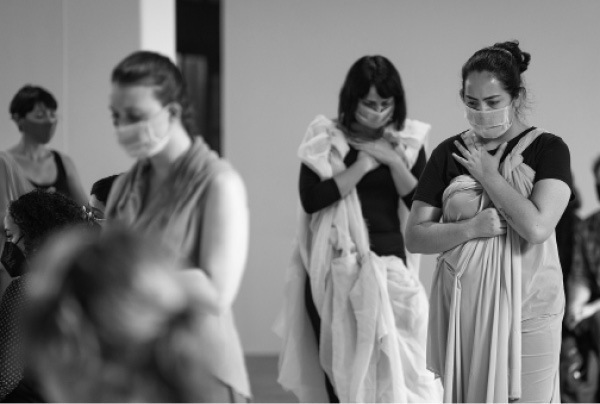
ONLY REMAINS REMAIN
first performed on October 22, 2021
MoMA PS1, Long Island City, New York City, NY
performed three times in 2021
FREYA POWELL
Liz Altmann, Samuel Lang Budin, Nina Dante, Laura Murphy, Shanna Iglesias, Lindsay Mayberry, Natasha Thweatt, Caroline Burkhart, Kate Garfield, Aline Salloum, Natasha Walfall, Courtnie Alvarado, Allison Gish, Christine Romulus, Cassandra DeMarco, Hannah Bailey, Maria Renee Lavalle, Joy Salomon Corlobe
Ridgewood, NY
freyapowell.com
ONLY REMAINS REMAIN
FREYA POWELL
“Only Remains Remain” is a fifteen-person performance addressing a contemporary tragedy through the characters of Antigone. Using a chorus to communicate an elegy for the unidentified migrants that were buried in mass graves in Sacred Heart Cemetery the piece brings attention to ambiguous loss and our complicity in this history.
Sacred Heart Cemetery in Brooks County, Texas is a small county-run graveyard that housed hundreds of unidentified migrants who died in the harsh desert landscape while traveling north. The county buried these individuals, whose remains were found on nearby farms, without following traditional burial standards, in mass graves that bear no names. In 2013, forensic anthropologist Dr. Lori Baker and her team started to exhume the remains and ascertain, through DNA testing, the identities of the deceased, echoing the heroic Antigone defying the state to honorably bury her brother.
At the center of the stage is a heap of earth around which are four vocalists. Eleven actors then form an outer circle enclosing the audience within the two circles. The audience, seated within the performers, are immersed in the chorus’ bodily utterances, witness to the retelling of this contemporary tragedy, and awakened to their complicity. Exploring the voice as the medium this piece tests pitch, tone, pacing, and silence from operatic singing to theatrical utterances.
Dressed in layers of draped, grayscale chiffon, echoing Greek columns, they perform, through speech and improvised song, an elegy communicating the migrants as Polyneices traveling north, the loss of life, the silence that their disappearance was met with, our role as Ismene realizing our complicity, and the forensic anthropologists’ role as Antigone respectfully exhuming and identifying the remains. By reinterpreting these archetypal Greek characters, I am inviting the audience to see our current moment from a new perspective.
This performance looks at how tragedy can help us begin to understand violence and grief. The authorities of Brooks County buried the found migrants bodies in mass graves with little or no effort to identify them. In addressing this recent history and the lack of attention it received on a national scale the performance asks the question: when does a life become grievable?